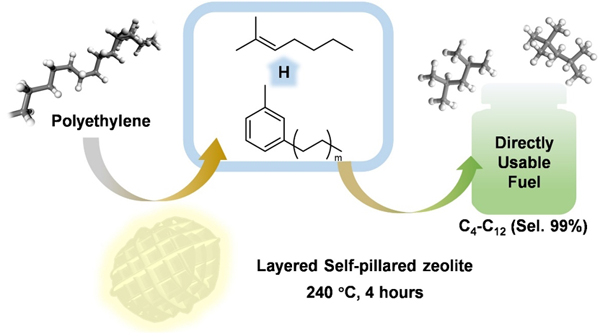Researchers develop a self-supplied hydrogen strategy for upcycling of polyethylene to gasoline
Plastic waste is causing damage to the ecosystem and threatening the human health. On the quest to address plastic pollution problem, scientists have long sought ways to transform waste plastic into value-added chemicals and fuels. Polyethylene (PE), one of the most prevalent and robust plastics, is very difficult to convert without high temperature or noble metal catalysts and external hydrogen resources.
In a study published in Nature Chemistry, the research group led by Prof. HAN Buxing and LIN Longfei from the Institute of Chemistry of the Chinese Academy of Sciences (ICCAS) with collaborators successfully transforms PE into high quality gasoline with a yield of 80% at a mild temperature (240 ℃) without using of noble metal, hydrogen and solvents.
In this work, the researchers used a layered self-pillared (LSP) zeolite with hierarchical porosity to enrich exposed acid sites, which effectively facilitate the interaction between PE and catalytic active sites. In addition, the unique open Framework Tri-coordinated Al (oFTAl) species in the LSP zeolite promote the activation of PE and accelerate its conversion.
The researchers found that part of pre-cracked intermediates undergoes cyclization and aromatization to generate hydrogen over LSP zeolite during the cracking process. The hydrogen is then used in the hydrogenation of alkenes generated from cracking of PE. This self-supplied hydrogen strategy affords the produced gasoline with high concentration of iso-alkanes, approximately twice that of commercial gasoline, thereby enhancing the quality of gasoline.
This study provides a new route to convert PE to high quality gasoline and shows great practical potential. The research was supported by the National Natural Science Foundation of China, the Ministry of Science and Technology of China, and the Chinese Academy of Sciences.

Self-supplied hydrogen strategy over LSP zeolite (Image by CEN Ziyu)
Contact:
Prof. HAN Buxing, Prof. LIN Longfei
Institute of Chemistry, Chinese Academy of Sciences
Email: hanbx@iccas.ac.cn, linlongfei@iccas.ac.cn





